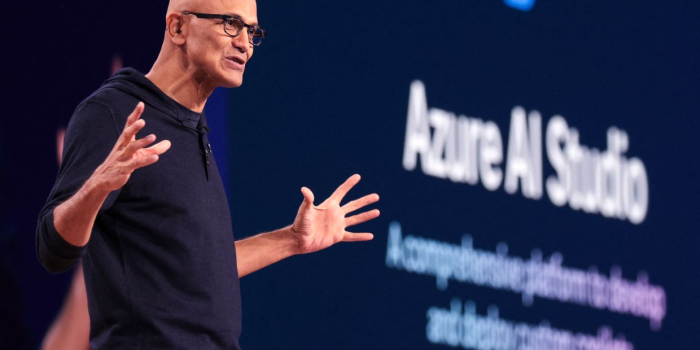Microsoft CEO Satya Nadella gave an opposing viewpoint on the interaction with artificial intelligence tools one week after OpenAI unveiled a personal assistant that could laugh, sing, and speak in many different kinds of voices.
“I don’t like anthropomorphizing AI,” Nadella stated in an interview with Bloomberg Television on Monday, criticizing the practice of attributing human-like qualities to AI using verbs and nouns typically reserved for people. “I sort of believe it’s a tool.”
The extent to which AI services should be humanized is a topic of discussion within the IT industry that Nadella’s views have brought to light. The debate takes place at a moment when artificial intelligence technology is exhibiting more and more human-like tendencies. While it is conceivable to develop AI systems that “show emotion,” a Google executive told Bloomberg last week that the company would instead concentrate on being “super helpful and super useful.”

OpenAI, on the other hand, has adopted a more human-like approach. The company unveiled a new voice assistant that can recognize and convey emotions. The AI voice engaged during the presentation in a way that some social media users compared to the dystopian movie “Her,” particularly as one voice choice was purported to resemble Scarlett Johansson.
Johansson revealed in a statement to NPR that OpenAI’s CEO, Sam Altman, had approached her about voicing an audio chat feature, suggesting she could “help consumers feel comfortable with the seismic shift concerning humans and AI.” Johansson declined and subsequently hired lawyers over OpenAI’s decision to proceed with a similar-sounding voice. OpenAI has since replaced the contentious voice.
Before ChatGPT brought AI into the mainstream, tech companies often imbued AI programs with human personalities, typically using female-coded names and traits to make the technology more relatable. Microsoft, Nadella’s own company, has followed this trend with AI entities like Tay and Cortana and the Bing AI persona Sydney. This inclination to describe AI in human terms stems from a desire to make the underlying complexities of AI more understandable to users, leading to phrases like AI “learns.”

However, Nadella emphasized recognizing that AI’s capabilities do not equate to human intelligence. “It has got intelligence if you want to give it that moniker, but it’s not the same intelligence I have,” he explained.
Nadella even criticized the term “artificial intelligence,” first coined in the 1950s. “I think one of the most unfortunate names is ‘artificial intelligence’ — I wish we had called it ‘different intelligence,’” he remarked. “Because I have my intelligence. I don’t need any artificial intelligence.”
Ultimately, Nadella envisions a practical relationship with AI, focusing on utility. “That’s, I think, the ideal relationship,” he concluded.


